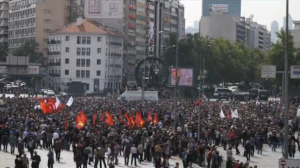
Thousands of people gathered for a rally in Ankara on Sunday to mourn nearly 100 victims killed a day earlier in the worst terrorist attack in Turkey’s modern history.
The rally took place at noon in the heart of the capital city of Turkey to condemn the twin suicide bombings that claimed at least 95 lives at Ankara train station. The casualty count is expected to rise as dozens of victims remain in intensive care.
The mourners attempted to lay carnations at the scene of the attacks to pay tribute to the victims, but were blocked by police forces.
They marched throughout the day very close to the scene and once chanted anti-government slogans. Some targeted the Turkish President Recep Tayyip Erdogan directly with their chants–- calling him a “thief and a murderer”.
Many of the young demonstrators appeared full of rage.
“Many young people from all across Turkey have begun to lose their faith in seeking democracy in a peaceful manner. Many people in Turkey, be it young, female, male – have started searching for other ways to continue their struggle. If the perpetrators continue attacking us – unfortunately, they will be facing violence in return,” said a protester named Kaan Dinc, a union member who participated in the peace rally.
Some others seemed traumatized.
“I’m a mother, my daughter came home with blood all over her hair… her whole body was covered with her friends’ blood. What would a mother feel!” Zeynep Kaya recalled the moment she reunited with her daughter after the attack.
Despite palpable tension within the crowd and aside from momentary scuffles, no clashes broke out with police forces –- who were standing by with water cannons and gas masks at the ready.
In tears and despair, the crowd then paid their respects to relatives of the victims, in ceremonies that took place prior to funerals.
The pro-Kurdish People’s Democratic Party leader Selahattin Demirtas was on site, trying to comfort the families.
Demirtas has openly blamed the government for the attacks. He predicted the consequence would not be one of violent revenge, but rather a rising up carried out at ballot boxes — in parliamentary elections on November 1. (Reuters)







